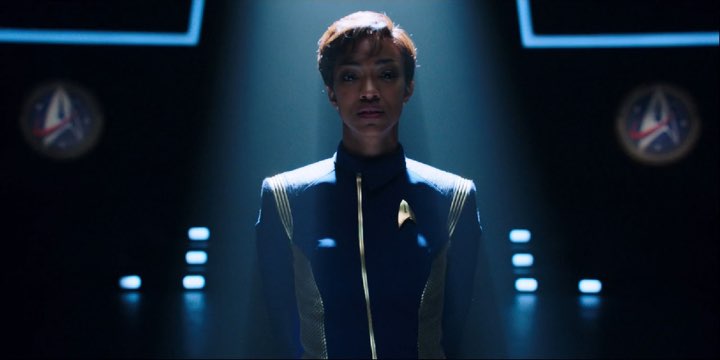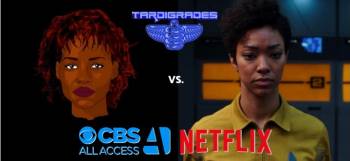
Star Trek: Discovery‘s lead character, Michael Burnham (Sonequa Martin Green), on trial. Image/CBS
UPDATED JANUARY 4, 2019 | ESTIMATED READING TIME 5 MINS
CBS Asks Judge to Dismiss Copyright Case Against Discovery
Abdin’s Lawyers Signal They’re Filing a Third Amended Legal Complaint
Lawyers for CBS and Netflix have asked the judge in the case filed by game developer Anas Abdin for a meeting before their planned filing of a motion to dismiss in Abdin’s lawsuit alleging copyright infringement in the development of Star Trek: Discovery.
Third Complaint Expected
UPDATE On January 2, 2019, a status letter from both plaintiff and defendants to the new judge in the case revealed that a third amended complaint was expected to be filed in the case; CBS’ motion to dismiss won’t be filed until after that amended complaint is filed, the letter stated.
READ the January 2, 2019, status letter that signaled a third amended legal complaint was expected to be filed by Anas Abdin. The 11-page letter also provides a brief recap of arguments in the case so far. Download the status letter here (PDF).
Conference Scheduled
U.S. District Judge Lorna G. Schofield scheduled a pre-motion conference regarding the defense’s planned motion to dismiss the case. That conference will be January 8, 2019, in New York. Ahead of that meeting, each side must filed a status letter and case management plan by January 2.
New Judge Assigned
Thé Tardigrades lawsuit was reassigned to U.S. District Judge Lorna G. Schofield on December 11, 2018. No reason was cited in the case docket but such changes are not uncommon, and usually intended to even out caseloads among judges in the district, according to the court’s website.
Schofield, a former federal prosecutor, was appointed to the bench by President Barack Obama in 2012. Like Judge Buchwald, Schofield also requires a pre-motion conference, where “motions will be resolved … to the extent possible. If briefing is found to be necessary, the issues to be considered will be defined and a briefing schedule and return date set.”1)
Lawsuit Fails to State a Claim
In a December 3, 2018, letter to federal District Judge Naomi Reice Buchwald, CBS/Netflix attorney Wook Hwang asserted that Abdin’s lawsuit fail to state a valid claim of copyright infringement. Hwang’s letter states Abdin failed to:
- Demonstrate how his unpublished game, Tardigrades, was substantially similar to Discovery.
- Provide links to the allegedly infringed works online, other than submitting a short treatment describing the game.
- Provide evidence supporting his claim Discovery‘s creators ever accessed Abdin’s work.
- File his copyright registration in time to be able to claim statutory damages and attorneys’ fees.
- State a valid claim to rights under the international copyright agreement, the Berne Convention — Abdin is a Kuwaiti resident — and under the U.S. Visual Artist Rights Act of 1990 (VARA), which recognizes the concept of creators’ lasting moral rights to their work.
- Establish Netflix’s liability in the case since the streaming service only distributes Discovery overseas, and the Copyright Act does not apply outside the United States.
Abdin Concedes Arguments
In a December 5 letter to the judge replying to Hwang, Abdin's attorneys, John Johnson and Allan Chan, appeared to concede some of CBS/Netflix’s arguments:
- Late copyright registration disqualified the game developer from seeking statutory damages and attorneys’ fees under the U.S. Copyright Act. Abdin’s attorneys appeared to shift their claims for damages and fees to VARA.
- Abdin was not entitled to make claims in the United States under the Berne Convention.
Conference Required by Judge
A letter like that sent by Hwang of the firm Loeb & Loeb is not generally required under the Federal Rules of Civil Procedure, but both Judge Buchwald and Judge Schofield’s individual rules require a pre-motion conference before any motion can be filed; attorneys therefore had to submit a letter explaining the basis of their upcoming motion asking the judge to formally dismiss Abdin’s case.
The request for a pre-motion conference effectively halts the ticking clock on CBS/Netflix filing their formal reply to the lawsuit until after the conference.
« Most of Abdin’s claimed ‘similarities’ are generic and stock elements that are used in countless works. » — CBS attorney Wook Hwang, in a letter to the judge
Case Management Plan
Judge Schofield also required both sides to file a status letter and case management plan by January 2, before the conference six days later.
Grounds for Dismissal
Hwang’s letter details the reasons why the defendants want Buchwald to dismiss the case:
> Second Circuit law is clear that copyright claims should be dismissed at the pleading stage where either “the similarity between two works concerns only non-copyrightable elements of the plaintiff’s work, or because no reasonable jury, properly instructed, could find that the two works are substantially similar.”2)
Not Substantially Similar
Hwang focused on three “blackletter [legal] principles” why Abdin fails to show substantial similarity between his Tardigrades game and Discovery. Copyright law, he wrote, does not protect:
- Ideas, only an author’s specific expressions of an idea. Abdin’s claimed infringements center on ideas not protectable expressions of those ideas.
- Facts, particularly scientific facts, like the existence of the microscopic creatures tardigrades.
- “Scènes à faire,” a French term that in U.S. law refers to certain elements of a creative work not protected by copyright law when they are mandated by or customary to the genre.
'Random Similarities'
Hwang argued Abdin’s notion that use of a tardigrade — even one enlarged to human size — was not a protectable element of his game.
Beyond that, Hwang said, other elements claimed by Abdin to be infringing “are random similarities scattered throughout the works, which cannot support a finding of substantial similarity because it fails to address the underlying issue: whether a lay observer would consider the works as a whole substantially similar to one another.”
'Generic, Stock Elements'
Hwang went on to explain that “most of [Abdin’s] claimed ‘similarities’ are generic and stock elements that are used in countless works – including, for instance, a gay relationship, uniforms which delineate rank and the use of the term ‘emitter’ to describe a light-emitting device. Nor does Plaintiff own the stock character elements he claims have been infringed, such as a ‘Blond White Male’ who is a scientist, a ‘darker complexion homosexual male’ and a ‘female of African descent with messy curly hair.’”3)
Axanar Attorney Joins Case
According to court records, joining Hwang in the case was fellow Loeb attorney Jonathan Zavin, who led the 2015 copyright infringement case against Axanar and its producer, Alec Peters. That case was settled just days before its scheduled January 2017 trial after a federal judge threw out the Fair Use defense on which Axanar had relied to legally justify production of its nearly $2 million, never-produced feature film. 
COMMENTS
Discuss this article in AxaMonitor's Facebook group.
Keywords



